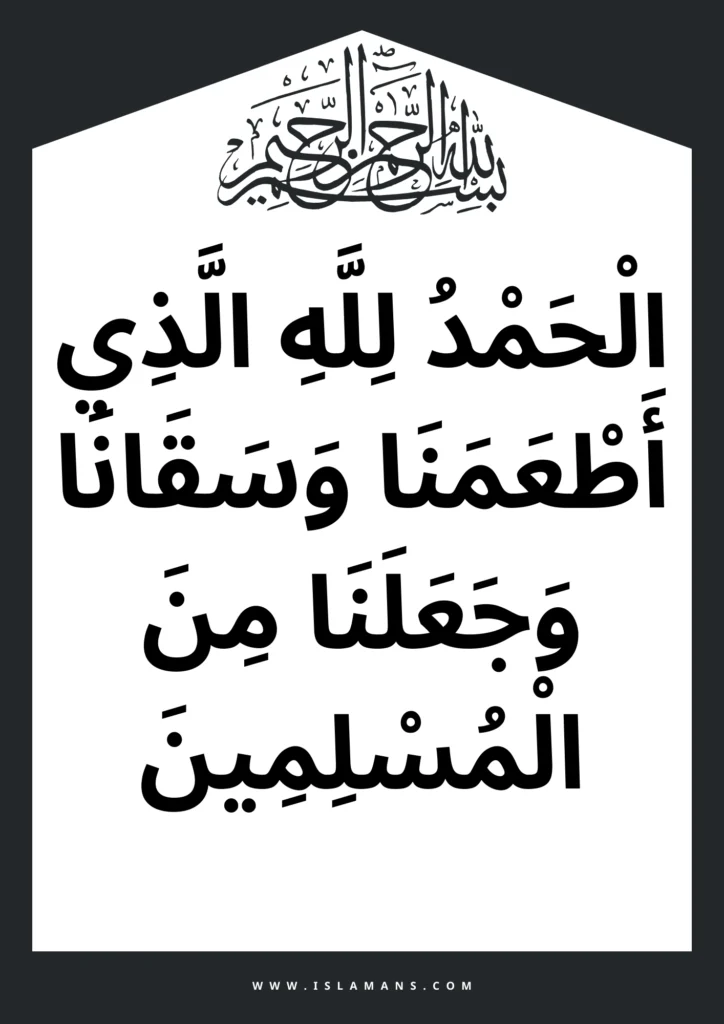In the heart of Islamic practice lies the beautiful tradition of dua, a word that means to summon or to call out. Dua is much more than a simple prayer or supplication it is a profound act of worship that has been emphasized by Prophet Muhammad (Peace Be Upon Him) as the essence of worship. Among the numerous supplications that Muslims recite, the Dua After Eating (Khana Khane Ke Baad Ki Dua) holds special significance.
In this blog post, we’ll explore the enriching practice of making dua after eating, its importance in Islam, and the benefits it brings to a believer’s spiritual life. You’ll also learn the specific words of the Khana Khane Ke Baad Ki Dua and how to incorporate it into your daily routine.
Khana Khane Ke Baad Ki Dua in Urdu Hindi & English Translation

The Arabic word “dua” translates to “supplication” or “invocation.” It is a way for Muslims to communicate with Allah, seeking His help, guidance, and blessings. Dua is not restricted to specific times or places; it can be made anywhere and at any time. This flexibility makes dua a powerful tool for fostering a continuous and personal connection with Allah.
Significance of Dua
Prophet Muhammad (Peace Be Upon Him) taught that dua is the essence of worship. When a person prays to Allah with a sincere heart, it strengthens their faith and reliance on Him. Dua is a means of expressing one’s hopes, fears, dreams, and uncertainties, trusting that Allah will provide the best outcomes.
Dua For After Eating

Encouragement from the Quran
Throughout the Holy Quran, Allah encourages believers to call upon Him. In Surah Ghafir, Allah says, “And your Lord says, ‘Call upon Me; I will respond to you.'” This verse highlights the importance of turning to Allah in supplication and the assurance that He listens to every prayer.
Dua for Every Occasion
Diverse Supplications
Islam provides a dua for nearly every aspect of life, from daily activities to specific needs. The Holy Prophet Muhammad (Peace Be Upon Him) taught various supplications for safety, family, food, travel, sickness, dressing, and more. These duas serve as a reminder of Allah’s presence in every moment of a believer’s life.
Importance of the Dua After Eating
Among the many supplications, the Dua After Eating (Khana Khane Ke Baad Ki Dua) is especially important. It acknowledges Allah’s provision and expresses gratitude for the sustenance provided. Reciting this dua helps believers develop a habit of thanking Allah for His blessings regularly.
Integral Part of Daily Routine
Incorporating dua into daily activities, such as eating, reinforces the habit of remembering Allah throughout the day. This practice not only increases mindfulness but also serves as a constant reminder of Allah’s mercy and generosity.
Benefits of Reciting Dua After Eating
Strengthening Faith
Reciting the Dua After Eating reinforces a believer’s faith in Allah’s provision and mercy. It serves as a reminder that everything one has is due to Allah’s grace and generosity.
Cultivating Gratitude
Expressing gratitude through dua helps cultivate a positive mindset. It encourages believers to focus on what they have rather than what they lack, leading to a more content and fulfilling life.
Enhancing Mindfulness
Making dua after eating promotes mindfulness by encouraging individuals to pause and reflect on the blessings they have received. This practice fosters a deeper connection with Allah and a greater awareness of His presence in everyday life.
How to Incorporate Khana Khane Ke Baad Ki Dua in Your Routine
Start with Intention
Begin by setting the intention to make dua after every meal. Remind yourself of the importance of this practice and the benefits it brings to your spiritual life.
Create Reminders
Place reminders in your dining area or set alarms on your phone to prompt you to recite the dua after eating. Over time, it will become a natural part of your routine.
Teach Family Members
Encourage your family members to join you in reciting the dua after meals. This practice can strengthen family bonds and create a shared sense of gratitude and mindfulness.
The Impact of Dua on Daily Life
Building a Stronger Connection with Allah
Regularly making dua, including the Dua After Eating, helps build a stronger and more personal connection with Allah. This connection serves as a source of comfort and guidance in all aspects of life.
Fostering a Positive Outlook
Focusing on gratitude through dua promotes a positive outlook on life. It helps believers recognize and appreciate the blessings they have, leading to greater contentment and happiness.
Encouraging Spiritual Growth
Incorporating dua into daily routines encourages continuous spiritual growth. It helps believers stay mindful of their relationship with Allah and strive to improve their faith and devotion.
Conclusion
In conclusion, the Dua After Eating (Khana Khane Ke Baad Ki Dua) is a beautiful and meaningful supplication that holds great significance in Islam. It is a powerful way to express gratitude for Allah’s provision, strengthen one’s faith, and cultivate a mindful and positive outlook on life.
By incorporating this dua into your daily routine, you can enhance your spiritual connection with Allah and foster a greater sense of gratitude and mindfulness. Remember, every meal is an opportunity to thank Allah for His blessings and to seek His continued guidance and mercy.

